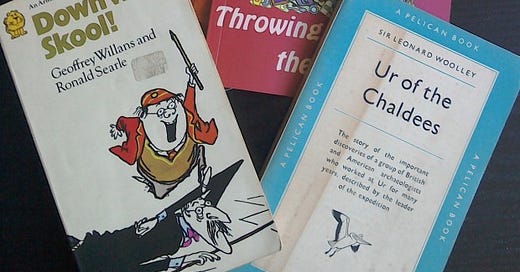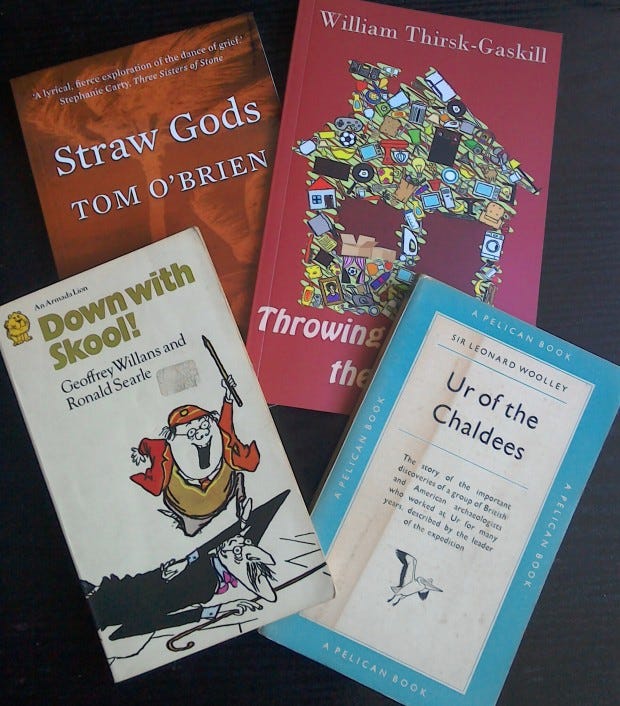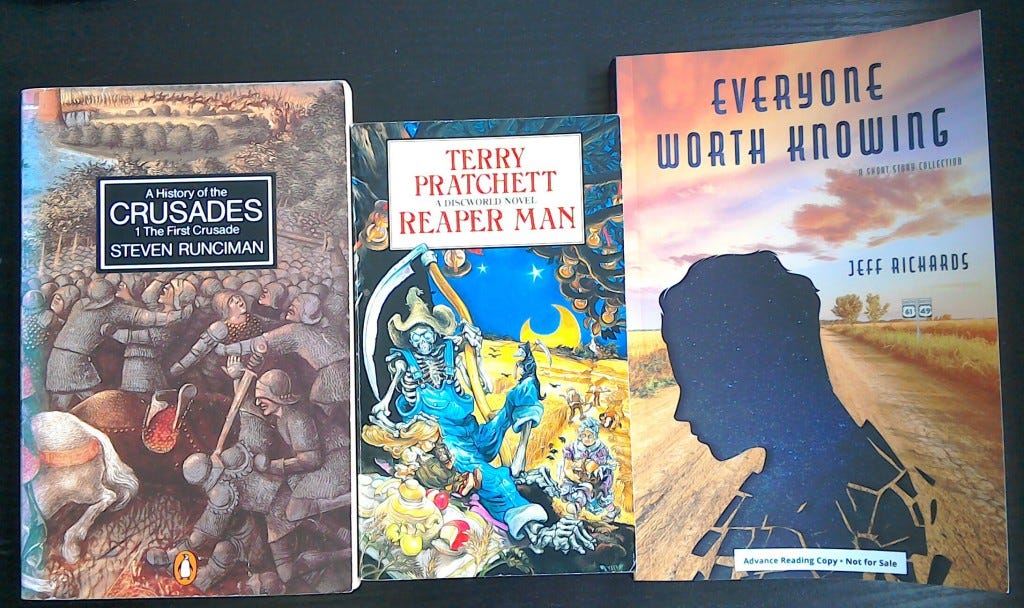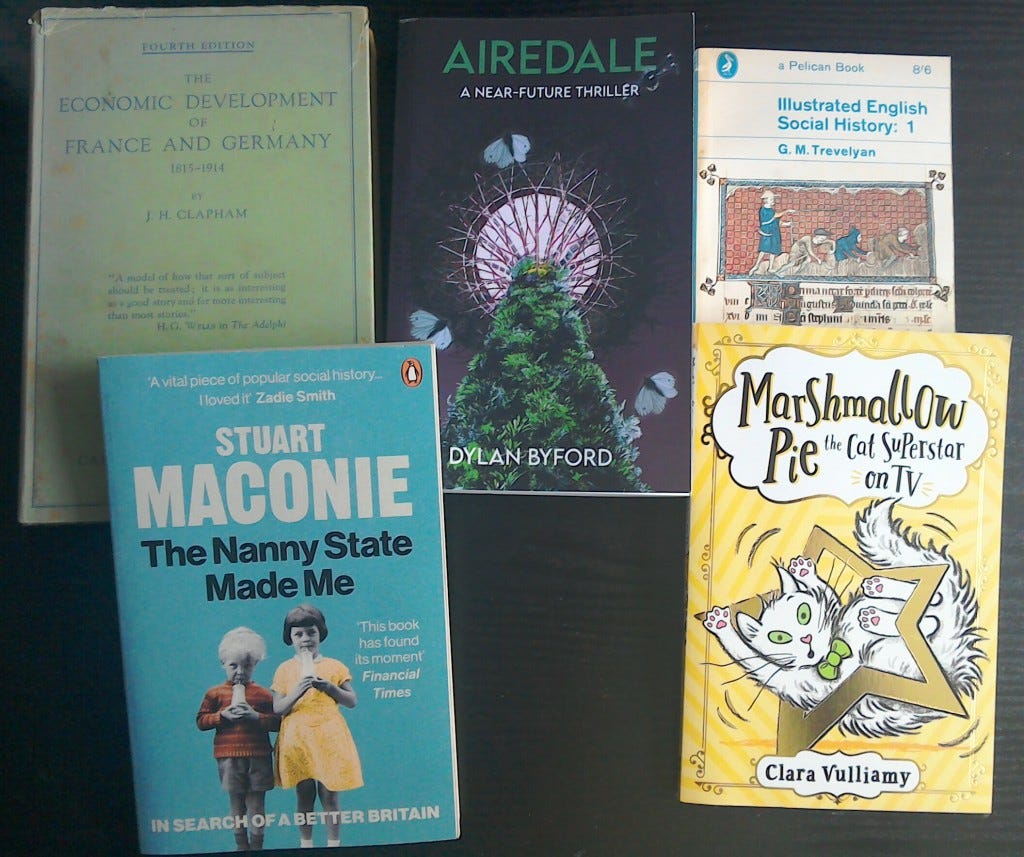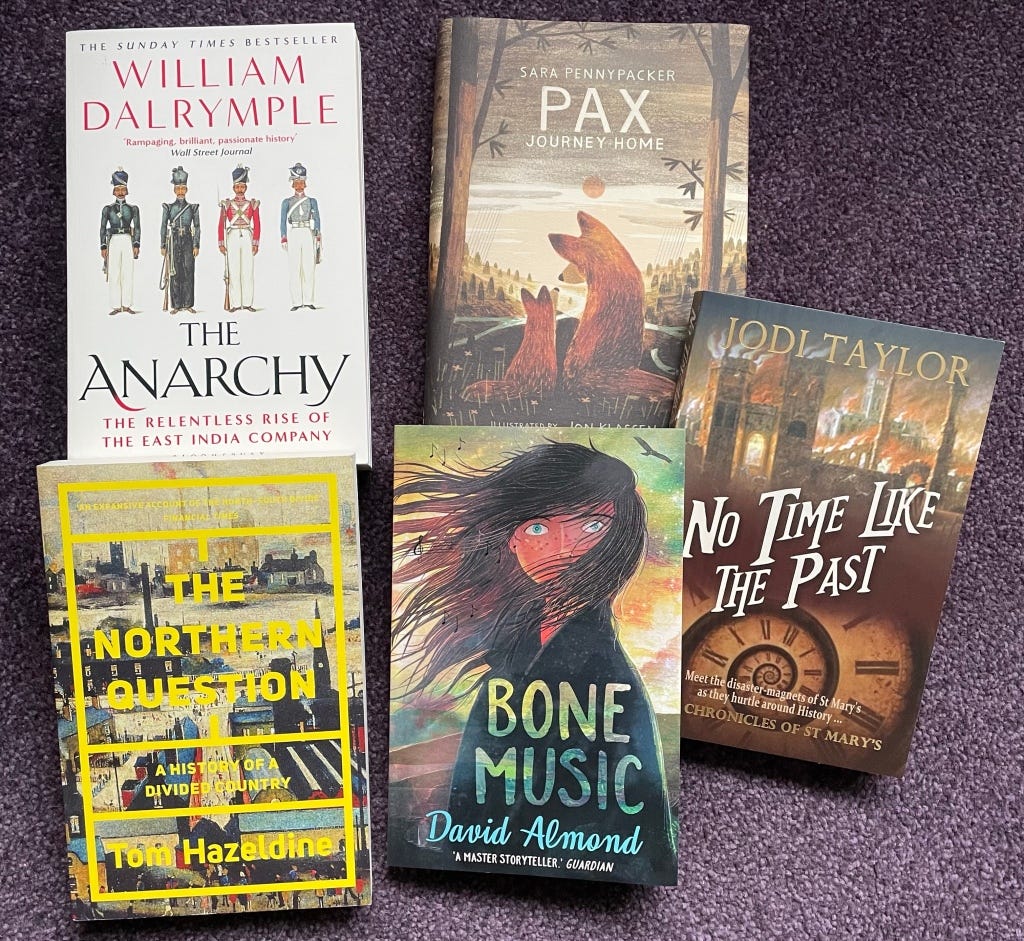Reading my way through 2021, slowly
After the hellish plague-year that was 2020 I was struggling with reading, particularly fiction. I couldn't quite muster the necessary concentration to parse words on a page, and there were certainly times when it felt like I had too much going on in my own life to start ferretting around for empathy I could spend on imaginary people. To make my reading year seem less overwhelming, and to allow for the fact I was still doing a big clearout of books with the vague intention of moving house sometime later in the year (which I haven't done but plans are afoot), I decided to look at it quarterly.
Up to the end of March I'd only read 4 physical books (pictured above) and 3 ebooks but I reviewed most of them at the time. You can find out what I thought of Gentlemen Prefer Blondes and the Ben Aaronovitch story collection Tales From the Folly in my first review of 2021 (short version: they were ok but didn't make my heart sing). I wrote at length about Ur of the Chaldees in February, popular archaeology from the 1920s and one for the Time Team fans. In March I shared my enthusiasm for The Bone Ships by RJ Barker, the first volume in a nautical other-world fantasy trilogy. Since then I've read volume 2, Call of the Bone Ships (even better) but not dared embark on the final volume as everyone who mentions it on Twitter talks about how much they cried! I reviewed the novella-in-flash Straw Gods for TSS, and you can read that review here.
I re-read Down With Skool! after listening to an episode of the Backlisted podcast about the collected Willans and Searle Molesworth books and it was comforting in its way but I gave up partway through the follow-up Whizz for Atoms as 1950s prep school boys began to seem too far removed from my life to bother with. When I last read the Molesworth books it was the 1980s and my staple reading included The Beano, Just William, Billy Bunter and Anthony Buckeridge's Jennings novels. How times have changed.
The re-reading continued with Reaper Man in the second quarter (Terry Pratchett at his best was sublime), when I read 3 physical books and 5 ebooks, 4 of which I reviewed here on the blog. They were the Teesside-set Ironopolis by Glen James Brown ("Imagine if one of the Angry Young Men of the 1960s had written a novel after getting really into dark folktales"); Diary of a Young Naturalist by Dara McAnulty whose title is self-explanatory; The Miniaturist by Jessie Burton set in 17th century Amsterdam and relating to the Dutch East India Company; and spy thriller Slow Horses by Mick Herron. I also reviewed the short story collection Everyone Worth Knowing for TSS.
As usual I read a few history books this year. Steven Runciman's History of the Crusades is a three-volume set which OneMonkey bought (and part-read) twenty years ago when he had a daily train commute. I enjoyed Volume 1 which, despite being from the 1950s, seemed remarkably even-handed in its treatment of the various parties and he comes across as rightly disgusted by the behaviour of some of the supposedly Christian crusaders. It covers a lot of background and context, whereas Volume 2 (where I stalled about a third of the way through) felt more like a blow by blow account of pitched battles and sieges undertaken by people with frustratingly similar names - way too many people called Baldwin or Ralph. See also The Anarchy by William Dalrymple, which I read in the autumn. I did read that one all the way to the end but I kept getting bogged down in battle detail and similarly-named leaders and generals. It was a fascinating (and horrifying) account of the East India Company's takeover of a huge chunk of India, which I had only a passing acquaintance with but ought to be taught in British schools.
In the third quarter I read 5 physical books and 3 ebooks. Airedale is a sci-fi police procedural set in Yorkshire, so you can imagine how much I enjoyed it - I even bought a copy for The Nephew for Christmas. I also gave rom com a go and ended up reading The Cornish Cream Tea Bus by Cressida McLaughlin which turned out not to be my cup of tea and The Split by Laura Kay which was most enjoyable and quite funny (no coincidence that it's set in Yorkshire). The Economic Development of France and Germany was dry, old-fashioned history (written between the wars) full of tables of wheat production and steam engines per head of population. When I'm in the right mood I love that stuff, and I learnt so much about the textile industries of France and Germany as compared to Yorkshire (and he does indeed compare them to Yorkshire and sometimes specifically Bradford), and agricultural methods compared to the small amount I know about England. If you like that kind of detail I recommend it.
Interestingly I read 5 physical books and 3 ebooks in the last quarter of the year as well, including a couple of Maigret novels by Georges Simenon, and Christopher Eccleston's raw memoir I Love the Bones of You which wasn't an easy read.
As well as Maigret I've been comfort-reading in the form of children's books and more Jodi Taylor. Jodi Taylor writes deceptively simple fantasy novels that you can reliably turn to. In The Chronicles of St Mary's we follow Max (Dr Maxwell) as she does historical research in contemporary time - don't call her a time-traveller. Someone will probably die, others will be in deadly peril, they'll visit some famous moments in history, and Max will be inappropriately flippant. It's usually an enjoyable romp with heart-wrenching moments. This year I read book 5, I've got books 6 and 7 on the To Read shelf, there are short stories available too, and she writes other related strands (like Torchwood or the Sarah Jane Adventures are to Doctor Who).
David Almond came to one of the New Writing North How to Start Writing the Climate workshops during the summer to talk about his new YA novel Bone Music. Set in the north-east of England (Kielder I think) it's about a city girl who goes on climate marches but is used to all mod cons. She spends a short time in the tiny village where her mum was born and deepens her connection to nature, helped by a lad of her age who plays an ancient bone flute. It has a great sense of place, some lovely description and plenty to think about.
I was disappointed with both The Nanny State Made Me, and The Northern Question, in part because I had unreasonably high expectations. I'm not a professional historian, but neither are Maconie or Hazeldine and I've probably read the same books and articles as they have, for the most part. Other than the anecdotes from interviews, I learnt nothing new from Stuart Maconie's book, and the history in the Northern Question up to about the 1970s was largely familiar to me as well. I like Stuart Maconie's affectionately irreverent style but it was not on show in Nanny State, I think the subject matter meant too much to him to step back and treat it even-handedly and it verged on hagiography at times. Consequently, I'm not sure who the book is aimed at; fans of the welfare state will learn little they didn't already know, and those he's seeking to persuade will spot the rose-tinted view of the flaws and wonder if he's also over-egged the upside. Hazeldine's book was good on the subtle machinations of post-war politics (I mean, it was good at summarising the centuries before that too, but I knew most of that stuff) and made me properly angry at a selection of ministers, not just Mrs Thatcher. I did get annoyed at his use of the term 'rustbelt' to refer to the post-industrial north (with friends like these, etc...) but I'd recommend it particularly to left-wingers who are under thirty-five or not from the north of England and don't quite understand the context for Brexit and the 'crumbling of the red wall'.
As usual, about two-thirds of my reading this year was fiction but unusually, less than half of that was SFF. I finished fewer books than usual: 31, my lowest annual total since 2006 which was the year I parachuted out of my PhD with my sanity barely intact. However, what doesn't usually get mentioned in the end-of-year round-up are the books I started but gave up on. As well as the couple I've referred to above, I abandoned a book on the geology of England and Wales after about 50 pages; gave up on a book of SJ Parris novellas which I wrote about anyway; I tried a few Maxim Gorki novels inherited from my great-uncle and decided I didn't like his writing style; there were a couple of Doctor Who novels I just couldn't get into; a couple of dry old-fashioned history books that somehow didn't grab me like The Economic Development of France and Germany did. And those are the ones I can remember off the top of my head. I've also been darting about this year, instead of only having one book on the go at once (or one fiction and one non-fiction, occasionally) I'm currently partway through two local history books, Vesper Flights by Helen Macdonald, and Mordew by Alex Pheby, and I fully intend to finish them all. Just not yet.
Here's to the new year, may it be kinder to all of us. I hope you find some enjoyable books to read, and if I've helped you along in that respect you can always buy me a cuppa at https://ko-fi.com/jysaville

